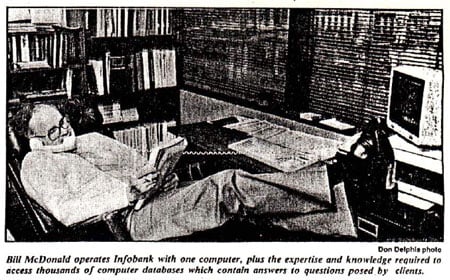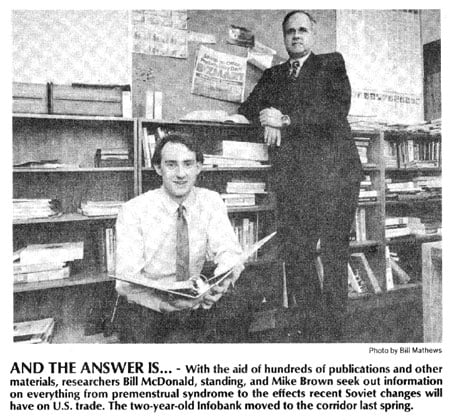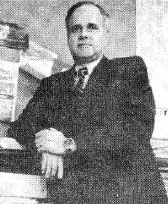I'd just moved to Kansas City and heard Bill McDonald, the founder of Kansas City Infobank, interviewed on the Mike Murphy radio show. I wrote Bill a letter following the show and eventually went to work for him six months later.
Bill McDonald changed my life’s trajectory. In multiple ways.
In some ways that led to my most treasured career successes; in other ways that challenged me then and make me shake my head, even now.

He died April 7, 2023. I learned about Bill’s death from his apartment manager via voice mail. Long story behind that.
Rather than that story, I’d rather talk about the many important things that I learned from Bill McDonald.
Here’s a partial list.
Strategy is nearly all about the recommendations
When you’re in a professional setting, people expect you to know your stuff. Start recommending what you think they should do right away in what you write, even though those recommendations will likely emerge later in the strategy process. Don’t present things in the order you worked on them; present them in the order of importance to the reader. Sometimes the great strategies come from the work; other times, you know the big things to do upfront, because you are that good. Don’t tip your hand to those big ideas during the process, though. Pitching those ideas later makes things dramatic. Save them for the finale.
The marvel of having balls like crazy
Bill once called Warren Buffet for an interview. Warren turned him down. I think he also tried to talk to Frank Morgan, which was an equally ballsy thing in Kansas City back in the day. Bill would call anyone and use smarts, cunning, and that voice to get them to talk.
I used to sit at my desk and marvel at Bill’s audacity in picking up the phone and getting people to share sensitive information with him. I wished I could do that like he could; I’ve never been able to do it like Bill.
Secondary research is step one
Of everything, learning secondary research from Bill has most dramatically shaped my life. Bill introduced the idea to me that so many questions business people ask are already answered somewhere.
The first step, even though it’s called secondary, is to research and always look for those answers to get as smart as possible as quickly as possible. Those answers might be in articles or directories, at associations or libraries (especially special libraries) or inside experts’ heads (and all the employees inside companies who are the best experts you can reach). Now, the answers are likely online. They may come flowing from AI (but be careful about those answers). The point is this: ask questions first, gather the answers, and then map all the clues for where you look next.

What not to do in a small business
Over-spending. Thinking cash isn’t king. Getting a fancy office and stationery that few people will ever see or notice. Hoping that an important-looking presence and an image will pay the bills. Ignoring the distinction between personal and business expenses.
When I started Brainzooming, I reversed all of these lessons and, financially, ran it like the opposite of Infobank. On the other hand, there are times - not a few times - where I accidentally refer to Brainzooming as Infobank. That suggests some pretty strong positive similarities in the two businesses. What I knew about the provider side before starting Brainzooming came from my time at Infobank.
So many other important things
Thinking back on nearly three years with Bill at Infobank, he opened the door to all of these things for me. I expect to add to this list as I recall even more things.
- Gaining comfort with figuring out my plan as I go
- Online search principles
- Recognizing information that’s valuable and eliminating what’s not germane
- That your time is your inventory in a service business
- Interviewing lead users to find out what the future looks like to them
- Estimating market sizes and doing sales forecasting
- The rule of 3s or 4s for services pricing
- Wariness about entrepreneurs with fanciful ideas
- When you're stuck making progress, make an artifact
- Creating a situation analysis
- Working with databases
- Quicken
- Schmoozing with gatekeepers
- Ashlar (my favorite interior paint color)
- The amazing things that reference librarians can do to help you
- Wholesale and retail markups and pricing structures
- Shopping for offices
- Talking your way into places
- Arthur Bryant’s Barbecue
- Teamsters Local 41
- Desktop publishing and graphics
- Plastikoil binding
- Venture capital
- The Lehman Formula
- Larry King’s old late-night radio show and sleeping on the office floor
- J.R.R. Tolkien
Ideas have to translate into action
I didn’t include Bill in Idea Magnets. Part of that was diversifying, as best I could, the range of people the book features. Another aspect was me wanting to underscore that one thing that sets these creative leaders apart is their ability to shift into implementation mode and get things done. Bill was a wealth of big ideas. Implementation was a struggle, at least by the time we worked together.
Yes, I could have inserted my story with Bill into Idea Magnets. His omission, though, may have been revenge for too many all-nighters and shouldering a heap of anxiety waiting on him to work the Bill McDonald magic on his part of a critical project.
I regret leaving him out of the book. It would have meant so much to him because of how lovingly proud he was of what I’ve accomplished. Every time we talked, he’d apologize for not turning more of his big dreams for Infobank into reality. I, in turn, routinely reminded him how important he was to the foundation of everything in my career. I always say Infobank was like a second MBA grounded in discovering the analysis, strategy, and most importantly, the recommendations, that senior executives really need.
I’m usually good about giving people the tributes before they are gone. Bill’s is an instance of where I waited too long. I'm sorry about that.
Take care, my friend.
Mikey





